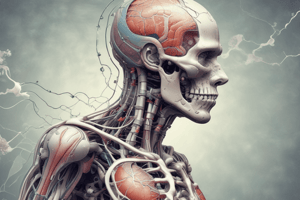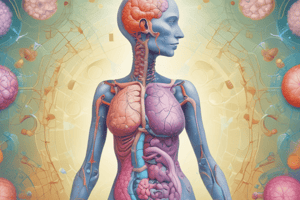Podcast
Questions and Answers
Which function of calcium is directly related to the cardiovascular system?
Which function of calcium is directly related to the cardiovascular system?
- Regulates heart rhythm (correct)
- Assists in normal blood clotting
- Building strong bones and teeth
- Helps regulate the passage of nutrients in and out of the cell walls
Which statement is NOT one of the biological functions of calcium?
Which statement is NOT one of the biological functions of calcium?
- Helps maintain proper nerve and muscle function
- Enhances immune response (correct)
- Eases insomnia
- Acts as a second messenger for many hormones
What is the role of calcium in muscle contraction?
What is the role of calcium in muscle contraction?
- Inhibits the release of acetylcholine at the neuromuscular junction
- Increases the release of potassium ions from muscle cells
- Activates enzymes involved in muscle relaxation
- Binds to troponin to allow actin-myosin interaction (correct)
Which range is considered normal for total blood calcium levels in mmol/L?
Which range is considered normal for total blood calcium levels in mmol/L?
Calcium acts as a second messenger for many hormones. Which of the following hormones does NOT typically use calcium as a second messenger?
Calcium acts as a second messenger for many hormones. Which of the following hormones does NOT typically use calcium as a second messenger?
In which process does calcium NOT play a significant role?
In which process does calcium NOT play a significant role?
Flashcards are hidden until you start studying
Study Notes
Biological Functions of Calcium
- Calcium is essential for building strong bones and teeth.
- It regulates the passage of nutrients in and out of cell walls.
- Calcium helps regulate heart rhythm.
- It is necessary for proper nerve and muscle function.
- Calcium acts as a second messenger for many hormones.
- It eases insomnia.
- Calcium assists in normal blood clotting.
Clinical Significance
- The normal range of total blood calcium is 2.10-2.60 mmol/L or 8.5-10.5 mg/dl.
- Calcium plays a crucial role in various bodily functions, including:
Bone Structure
- Calcium is vital for building strong bones.
Muscle Contraction
- Calcium is necessary for muscle contraction.
Cellular Metabolism
- Calcium plays a role in cellular metabolism.
Nerve Impulse Transmission
- Calcium is important for nerve impulse transmission.
Wound Healing
- Calcium is required for the healing of wounds.
Eases Insomnia
- Calcium helps alleviate insomnia.
Studying That Suits You
Use AI to generate personalized quizzes and flashcards to suit your learning preferences.




